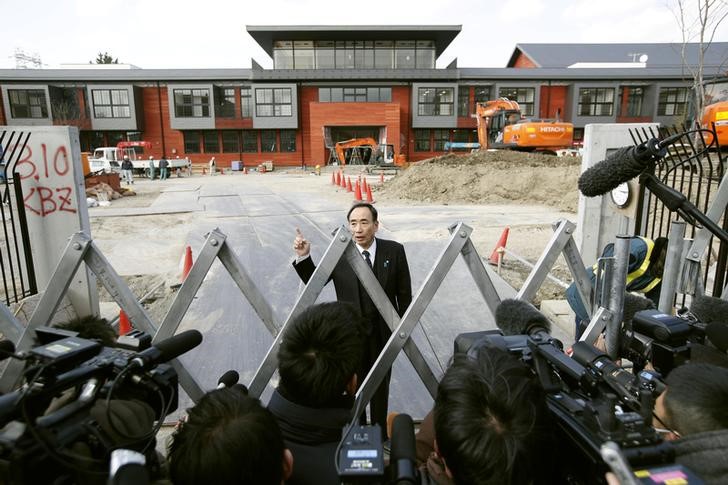By Kiyoshi Takenaka and Elaine Lies
TOKYO (Reuters) - The head of a Japanese nationalist school at the heart of a swirling political scandal said in sworn testimony in parliament on Thursday that he received a donation of 1 million yen from Prime Minister Shinzo Abe's wife in her husband's name.
The controversy has chipped away at Abe's support and even sent Japanese shares briefly lower on Thursday, but Abe has said neither he nor his wife, Akie, intervened in a sweetheart land deal in which educational group Moritomo Gakuen, based in Osaka, western Japan, bought state-owned land at a fraction of its appraisal price to build an elementary school.
Abe has also denied allegations by Yasunori Kagoike, who has said he would step down as head of Moritomo Gakuen, that Akie had donated 1 million yen ($9,000) on the prime minister's behalf.
Akie had been set to be honorary principal of the school, which was to open in April with a curriculum based on prewar patriotism that taught students to be subjects, not citizens. She cut her ties after the scandal broke. The group currently runs a kindergarten with a similar curriculum.
Kagoike, in testimony to an upper house budget committee under oath - which means he could face perjury charges if he is later found to have lied - said he received money from Abe's wife in 2015 when the two of them were alone in a room.
"She said 'please, this is from Shinzo Abe,' and gave me an envelope with 1 million yen in it," Kagoike said.
"Abe's wife apparently says she doesn't remember this at all, but since this was a matter of honour to us, I remember it quite vividly."
His testimony was broadcast live on four of Japan's six television networks.
Kagoike is a member of Nippon Kaigi, a nationalist lobby group that promotes a traditional ethos mixing Shinto myth, patriotism and pride in an ancient imperial line. The group has close ties to Abe and his cabinet.
RESIGNATION RISK?
Abe has denied he or Akie intervened in the land deal, or helped the school get accredited. He has said he would resign if evidence to the contrary were found.
Asked about the deal, Kagoike said: "My understanding is that political involvement probably took place regarding the acquisition of state-owned land."
Chief cabinet secretary Yoshihide Suga later on Thursday reiterated that Abe had not donated money either himself or through a third party, including his wife.
Abe's term as ruling Liberal Democratic Party (LDP) president ends in 2018 but a rule change means he can run for a third three-year term, allowing him to remain premier as long as the LDP stays in power.
The LDP had resisted opposition calls for Kagoike to testify but agreed after he said Abe had donated money, calling the allegation an "insult" to the prime minister.
Abe's support fell 10 points to a still-robust 56 percent in a Yomiuri newspaper survey published this week, the biggest drop since he returned to office for a rare second term in December 2012. He quit abruptly in 2007 after a year at the top plagued by scandals in his cabinet, an election drubbing and ill-health.
The Nikkei stock index fell to a 1 1/2-month low prior to the testimony before recovering, and analysts said the impact at this point does not appear to be long-lasting.
"It's true that everyone's interest is fixed on this issue for now, but markets believe the Abe government is handling it well," said Takuro Hayashi at Iwai Cosmo Securities.
"People still need to pay attention to whether there was government influence in the land deal, but the overall impact on the markets will be limited."

(Additional writing by Linda Sieg, additional reporting by Chris Gallagher, Yoshiyuki Osada and Ayai Tomisawa; Editing by Simon Cameron-Moore)